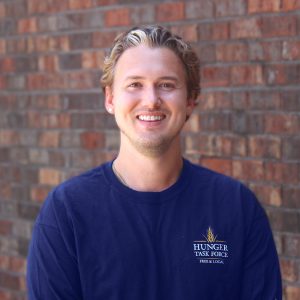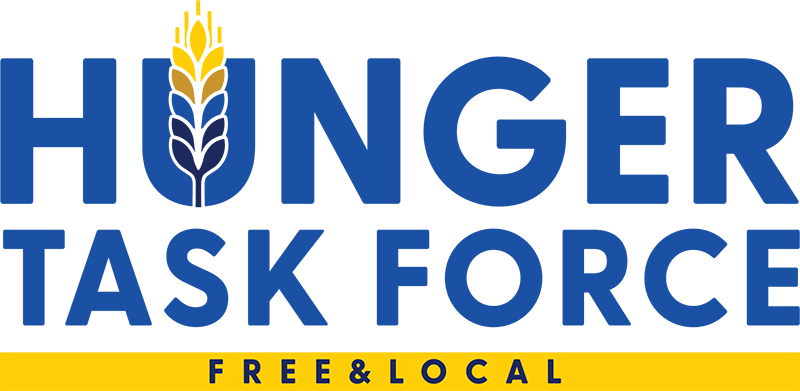Hunger Relief Federation welcomes new Field Organizer
Every other Wednesday at 11:00 a.m., anti-hunger leaders across Wisconsin, members of The Hunger Relief Federation, connect over Zoom to share important policy updates, develop a knowledge community, support each other and coordinate resources. At the most recent meeting, between discussions of Rural Development Grants and the re-evaluated Thrifty Food Plan, an exciting announcement was made to Federation members – Hunger Task Force has hired a new Field Organizer.
Still navigating his first week in the role, Matthew Grover is charged with strengthening, educating and expanding membership of The Hunger Relief Federation. This coalition, established by Hunger Task Force in 2016, works to expand the Free-Local-Independent model to anti-hunger organizations in Wisconsin.
“Throughout my career, I have advocated for those who were food-insecure,” says Grover. “However, I’ve never had the opportunity focus on hunger at this scale.”

Matthew Grover, Field Organizer
With a background in canvassing, case management and campaign organizing, Grover comes to Hunger Task Force with a wealth of experience in coordinating groups and expanding coalition strategy. “For a very long time I have been working in these types of organizations,” shares Grover. “After college I worked for a campaign consultant group in St. Louis – we got to do some amazing work on behalf of the American Civil Liberties Union and LBGTQ+ rights.”
Grover then worked briefly as a medical case manager for people living with HIV at Rain-Central Missouri, Inc. “I was the direct contact for 50+ individuals living with HIV/AIDs. I helped them with anything related to their diagnosis, including scheduling medical visits, accessing food and shelter or setting up mental health referrals – really anything they needed.”
Returning to Wisconsin, Grover strengthened connections across the non-profit sector of Milwaukee working at United Way of Greater Milwaukee & Waukesha County. As a Loaned Executive for the 2016 workplace giving campaign, he managed a portfolio of organizations hosting fundraising campaigns at their workplaces. “This role helped me get to know Milwaukee more intimately and connected me to a broad network of leaders across the city.”
An opportunity at Our Oregon, an organization dedicated to fighting for social and economic justice for Oregonians, moved Grover out west for several years. “As a Field Organizer, I worked directly with volunteers who supported the work,” says Grover. “Once I was promoted to Political Organizer I developed our coalition – this included finding community leaders, training them to share information with their networks and empowering these leaders to use their voice to affect public opinion on important issues.”
Now at Hunger Task Force, Grover brings a unique context and strategy to The Hunger Relief Federation from years of campaigning in the field. “The Federation is mutually-beneficial, giving each member the ability to amplify their impact.
Recognizing there are many great anti-hunger organizations working in a vacuum, unaware of what is happening beyond their own doors, Grover reflects on how The Hunger Relief Federation prioritizes collaboration. “This coalition builds solidarity, and Hunger Task Force has taken on that responsibility to be the convener, inviting people to the conversation. Members are more aware of funding and programmatic options they are eligible for. This knowledge and access help them meet the needs of the communities they are serving.”

Bard Meier, Advocacy Campaign Manager
Bard Meier, Advocacy Campaign Manager, has been working with the Federation since its formation five years ago. “The Hunger Relief Federation exists because hunger is not limited to just urban areas and cities – hunger in Wisconsin widespread and pervasive,” shares Meier. “Today, our member list includes 133 organizations, representing all 72 Wisconsin counties and 11 Tribal Nations.”
The COVID-19 pandemic has revealed the many inadequacies of existing systems initially established to help hungry families. With many in Wisconsin still struggling to find work, maintain housing, and access proper, nutritious food, membership numbers have surged since March 2020 – nearly doubling participation in the last 18 months. “The explosion in membership with the Federation illustrates this is not happening in just Milwaukee, this is happening across the state.” Grover continues, “Whether it’s urban, suburban or rural, these areas are hurting. The organizations that are serving these communities are realizing they do not have to do it alone.”
With plenty of work ahead of him, Grover eagerly accepts the challenge of supporting this robust, growing coalition. “The through line in my career has been all about outreach – having conversations and breaking down barriers. If I’m doing my job correctly, I won’t be in my office much, I’ll be out meeting people.” He continues, “I’ve been blown away by what the Hunger Task Force is capable of providing for Milwaukee and am excited to experience what The Hunger Relief Federation can accomplish across the state of Wisconsin.”
